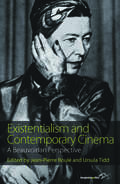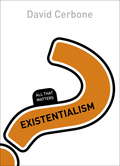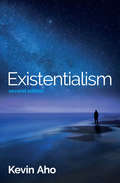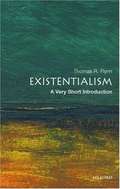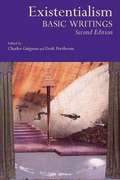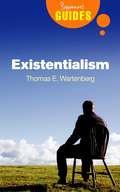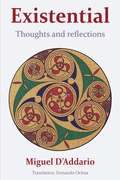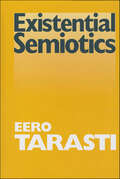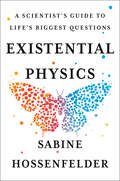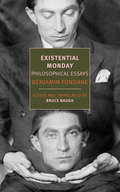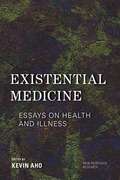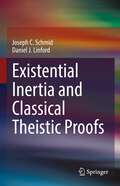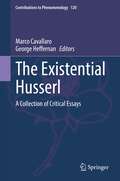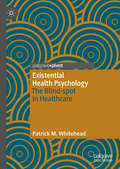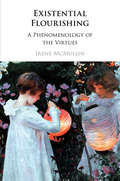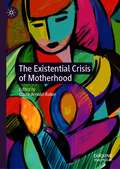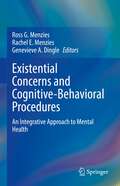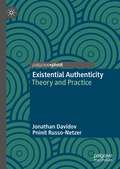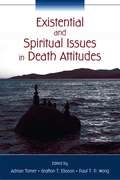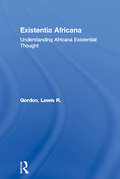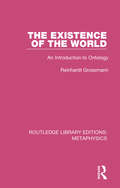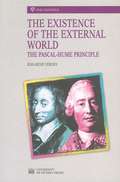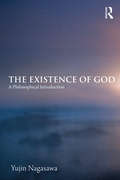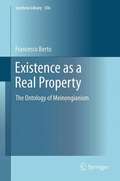- Table View
- List View
Existentialism and Contemporary Cinema
by Ursula Tidd Jean-Pierre BouleSimone de Beauvoir's work has not often been associated with film studies, which appears paradoxical when it is recognized that she was the first feminist thinker to inaugurate the concept of the gendered 'othering' gaze. This book is an attempt to redress this balance and reopen the dialogue between Beauvoir's writings and film studies. The authors analyse a range of films, from directors including Claire Denis, Michael Haneke, Lucille Hadzihalilovic, Sam Mendes, and Sally Potter, by drawing from Beauvoir's key works such as The Second Sex (1949), The Ethics of Ambiguity (1947) and Old Age (1970).
Existentialism: All That Matters (All That Matters)
by David CerboneWHAT DO YOU HAVE TO DO TO BE AN INDIVIDUAL?That is the question at the heart of existentialism and it informs this book's exploration of the existentialist tradition in 19th and 20th century philosophy.Existentialism: All That Matters considers each of the key figures - Kierkegaard, Nietzsche, Heidegger, Sartre, Camus and de Beauvoir - who all offer related, though distinct, conceptions of the task of becoming an individual.David Cerbone's book gives a fascinating introduction to existentialism and what matters most about it. ABOUT THE SERIESAll That Matters books are written by the world's leading experts to introduce the most exciting and relevant topics in an accessible, readable way. From Bioethics to Future Cities and Philosophy to Terrorism, the All That Matters series covers controversial and engaging subjects from science, philosophy, history, religion and politics. The authors are world-class academics or leading public intellectuals, on a mission to bring the most interesting and challenging areas of their subject to new readers.
Existentialism: An Introduction
by Kevin AhoExistentialism: An Introduction has established itself as the most comprehensive and accessible book on the subject available. In this fully revised and expanded second edition, Kevin Aho draws on a wide range of existentialist thinkers from both the secular and religious traditions, adding a wealth of new material on existentialism's relationship with Marxist thought and its impact on feminist phenomenology and critical race theory. Chapters center on the key themes of freedom, authenticity, being-in-the-world, alienation, and nihilism. Aho also addresses important but often overlooked issues in the canon of existentialism, including the role of embodiment, existentialism's contribution to ethics, political theory and environmental and comparative philosophies, as well as its influence on the allied health professions. By tracking its many and significant influences on modern thought, Kevin Aho shows why existentialism cannot be easily dismissed as a moribund or outdated movement, but instead endures as one of the most important and vibrant areas of contemporary philosophy. Existentialism remains so influential because it forcefully deals with what it means to be human and engages with fundamental questions such as "Who am I?" and "How should I live?" Existentialism: An Introduction is the ideal text for upper-level philosophy students and for anyone interested in the movement's key figures and concepts.
Existentialism: Bullet Guides
by Robert AndersonOpen this book and you will Understand existential thought Learn about the founders Clarify difficult concepts Examine its relevance
Existentialism: A Very Short Introduction
by Thomas Flynn"In this Very Short Introduction Thomas R. Flynn examines the philosophy at the core of the movement, providing a clear and accessible account of what existentialism really means. He focuses on several key existential themes, and along the way introduces the leading existentialist thinkers, from Kierkegaard and Nietzsche to Sartre and de Beauvoir."--BOOK JACKET.
Existentialism: Basic Writings
by Charles B. Guignon Derk PereboomThis book offers a brief introduction to the thought of four figures central to existential philosophy--Kierkegaard, Nietzsche, Heidegger, and Sartre. An introductory chapter presents the basic perspective and concerns of existentialism, and describes its place in the history of philosophy. Similar introductions are provided for each of the four philosophers, followed by selections from their major works. Background readings are also excerpted from works by Hegel and Husserl. No index. c. Book News Inc.
Existentialism: A Beginner's Guide (Beginner's Guides)
by Thomas E. WartenbergExistentialism pervades modern culture, yet if you ask most people what it means, they won't be able to tell you. In this lively and topical introduction, Wartenberg reveals a vibrant mode of philosophical inquiry that addresses concerns at the heart of the existence of every human being. Wartenberg uses classic films, novels, and plays to present the ideas of now-legendary Existentialist thinkers from Nietzsche and Camus to Sartre and Heidegger and to explore central concepts, including Freedom, Anxiety, and the Absurd. Special attention is paid to the views of Simone de Beauvoir and Franz Fanon, who use the theories of Existentialism to address gender and colonial oppression.
Existential, thoughts and reflections
by Miguel D'AddarioCompilation of writings and reflections form diverse themes and existential subjects. These are thoughts that take to analysis and observation of the words. A summary of texts that will make us see an alternative road of the usually written before. To think and meditate.
Existential Semiotics: Essays In Existential Semiotics (Advances in Semiotics #35)
by Eero TarastiExistential semiotics involves an a priori state of signs and their fixation into objective entities. These essays define this new philosophical field.
Existential Physics: A Scientist's Guide to Life's Biggest Questions
by Sabine Hossenfelder&“Stimulating . . . encourage[s] readers to push past well-trod assumptions […] and have fun doing so.&” —Science Magazine &“Hossenfelder is a rare gem. There are other theoretical physicists out there who can write for a popular audience, but very few of them are able to do so in such a no-nonsense way. The result is not just illuminating, but enjoyable.&” —Charles Seife, author of Decoding the Universe From renowned physicist and creator of the YouTube series &“Science without the Gobbledygook,&” a book that takes a no-nonsense approach to life&’s biggest questions, and wrestles with what physics really says about the human conditionNot only can we not currently explain the origin of the universe, it is questionable we will ever be able to explain it. The notion that there are universes within particles, or that particles are conscious, is ascientific, as is the hypothesis that our universe is a computer simulation. On the other hand, the idea that the universe itself is conscious is difficult to rule out entirely. According to Sabine Hossenfelder, it is not a coincidence that quantum entanglement and vacuum energy have become the go-to explanations of alternative healers, or that people believe their deceased grandmother is still alive because of quantum mechanics. Science and religion have the same roots, and they still tackle some of the same questions: Where do we come from? Where do we go to? How much can we know? The area of science that is closest to answering these questions is physics. Over the last century, physicists have learned a lot about which spiritual ideas are still compatible with the laws of nature. Not always, though, have they stayed on the scientific side of the debate. In this lively, thought-provoking book, Hossenfelder takes on the biggest questions in physics: Does the past still exist? Do particles think? Was the universe made for us? Has physics ruled out free will? Will we ever have a theory of everything? She lays out how far physicists are on the way to answering these questions, where the current limits are, and what questions might well remain unanswerable forever. Her book offers a no-nonsense yet entertaining take on some of the toughest riddles in existence, and will give the reader a solid grasp on what we know—and what we don&’t know.
Existential Monday: Philosophical Essays
by Benjamin Fondane Bruce BaughBenjamin Fondane--who was born and educated in Romania, moved as an adult to Paris, lived for a time in Buenos Aires, where he was close to Victoria Ocampo, Jorge Luis Borges's friend and publisher, and died in Auschwitz--was an artist and thinker who found in every limit, in every border, "a torture and a spur." Poet, critic, man of the theater, movie director, Fondane was the most daring of the existentialists, a metaphysical anarchist, affirming individual against those great abstractions that limit human freedom--the State, History, the Law, the Idea. Existential Monday, the first selection of his philosophical work to appear in English, includes four of Fondane's most thought-provoking and important texts, "Existential Monday and the Sunday of History," "Preface for the Present Moment," "Man Before History" (co-translated by Andrew Rubens), and "Boredom." Here Fondane, until now little-known except to specialists, emerges as one of the enduring French philosophers of the twentieth century.
Existential Medicine: Essays on Health and Illness
by Kevin AhoThis book offers cutting edge research on the modifications and disruptions of bodily experience in the context of anxiety, depression, trauma, chronic illness, pain, and aging. It presents original contributions in applied phenomenology, biomedical ethics, and the use of medical technologies.
Existential Inertia and Classical Theistic Proofs
by Joseph C. Schmid Daniel J. LinfordThis book critically assesses arguments for the existence of the God of classical theism, develops an innovative account of objects’ persistence, and defends new arguments against classical theism. The authors engage the following classical theistic proofs: Aquinas’s First Way, Aquinas’s De Ente argument, and Feser’s Aristotelian, Neo-Platonic, Augustinian, Thomistic, and Rationalist proofs. The authors also provide the first systematic treatment of the ‘existential inertia thesis’. By connecting the thesis to relativity theory and recent developments in the philosophy of physics, and by developing a variety of novel existential-inertia-friendly explanations of persistence, they mount a formidable new case against classical theistic proofs. Finally, they defend new arguments against classical theism based on abstract objects and changing divine knowledge. The text appeals to students, researchers, and others interested in classical theistic proofs, the existence and nature of God, and the ultimate explanations of persistence, change, and contingency.
The Existential Husserl: A Collection of Critical Essays (Contributions to Phenomenology #120)
by Marco Cavallaro George HeffernanThis book examines Husserl’s approach to the question concerning meaning in life and demonstrates that his philosophy includes a phenomenology of existence. Given his critique of the fashionable “philosophy of existence” of the late 1920s and early 1930s, one might think that Husserl posited an opposition between transcendental phenomenology and existential philosophy, as well as that in this respect he differed from existential phenomenologists after him. But texts composed between 1908 and 1937 and recently published in Husserliana XLII, Grenzprobleme der Phänomenologie (2014), show that the existential Husserl was not opposed but open to the phenomenological investigation of several basic topics of a philosophy of existence. A collection of contributions from a team of internationally recognized scholars drawing on these and other sources, the present volume offers insights into the relationship between phenomenology and philosophy of existence. It does so by (1) delineating the basic outlines of Husserl’s phenomenology of existence, (2) reinterpreting the tension between Husserl’s transcendental phenomenology and Jaspers’s and Heidegger’s philosophy of existence as well as Kierkegaard’s and Sartre’s existentialism, and (3) investigating the existential aspects of Husserl’s phenomenological ethics. Thus focusing on neglected aspects of Husserl’s thought, the volume shows that there is a consensus between classical phenomenology and existential phenomenology on the urgency of addressing the existential questions that in The Crisis of the European Sciences and Transcendental Phenomenology (1936) Husserl calls “the questions concerning the meaning or meaninglessness of this entire human existence”. The Existential Husserl represents a major contribution to the clarification of the historical and philosophical developments from transcendental phenomenology to existential phenomenology. The book should appeal to a wide audience of many readers at all levels looking for phenomenological answers to existential questions.
Existential Health Psychology: The Blind-spot in Healthcare
by Patrick M. WhiteheadThis volume critiques the increasingly reductive, objectifying, and technologized orientation in mainstream biomedicine. Drawing on the methods of hermeneutic phenomenology and existential analysis in the work of Martin Heidegger, Kurt Goldstein, Medard Boss, and Hans-Georg Gadamer, the author seeks to expose this lacuna and explore the ways in which it misrepresents (or misunderstands) the human condition. Whitehead begins by examining the core distinction in the sociology of medicine between “disease” and “illness” and how this distinction maps onto a more fundamental distinction between the corporeal/objective body and the experiential/lived body. Ultimately, the book exposes the tendency in modern medicine to medicalize the human condition and forwards a reorientation framed by what the author terms “existential health psychology.”
Existential Flourishing: A Phenomenology of the Virtues
by Irene McMullinThis innovative volume argues that flourishing is achieved when individuals successfully balance their responsiveness to three kinds of normative claim: self-fulfilment, moral responsibility, and intersubjective answerability. Applying underutilised resources in existential phenomenology, Irene McMullin reconceives practical reason, addresses traditional problems in virtue ethics, and analyses four virtues: justice, patience, modesty, and courage. Her central argument is that there is an irreducible normative plurality arising from the different practical perspectives we can adopt - the first-, second-, and third-person stances - which each present us with different kinds of normative claim. Flourishing is human excellence within each of these normative domains, achieved in such a way that success in one does not compromise success in another. The individual virtues are solutions to specific existential challenges we face in attempting to do so. This book will be important for anyone working in the fields of moral theory, existential phenomenology, and virtue ethics.
The Existential Crisis of Motherhood
by Claire Arnold-BakerThis book offers a new perspective on the motherhood experience. Drawing on existential philosophy and recent phenomenological research into motherhood, the book demonstrates how motherhood can be understood as an existential crisis. It argues that an awareness of the existential issues women face will enable mothers to gain a deeper understanding of the multifaceted aspects of their experience. The book is divided into four sections: Existential Crisis, Maternal Mental Health Crisis, Social Crisis and Working with Existential Crisis, where each section. Each chapter is based on either experiential research or the author’s extensive therapeutic experience of working with mothers and reflects different aspects of the motherhood journey, all through the lens of a philosophical existential approach. The book is essential reading for mental health practitioners and researchers working with mothers, midwives and health visitors, but it is also written for mothers, with the aim to offer new insights on this important life transition.
Existential Concerns and Cognitive-Behavioral Procedures: An Integrative Approach to Mental Health
by Ross G. Menzies Rachel E. Menzies Genevieve A. DingleClients enter therapy grappling with a range of difficulties. They don’t speak in diagnostic terms, but instead focus on the everyday problems that confront them. Their struggles may include isolation, loneliness, anxiety, guilt and regret, and problems making decisions in a world that offers seemingly endless choice. In contrast, the cognitive-behavior therapist is trained in the language of conditioning and extinction, avoidance and safety behaviors, behavioral activation and attentional biases. This book explores the ideas of the existentialist philosophers as a bridge between the suffering client and technically trained clinician. The volume is not a rejection of cognitive behavior therapy (CBT), but seeks to place CBT in the broader context of the most popular philosophic tradition of the 19th and 20th centuries. Therapists versed in existentialism argue that the individual's starting point is characterized by a sense of disorientation in the face of an apparently meaningless and absurd world. Each individual must become solely responsible for giving meaning to life and living it passionately and authentically. Each of us must confront the ‘Big 5’ existential issues of death, isolation, identity, freedom and meaning and find our solutions to these problems. The present volume explores each of these existential themes in turn. Each section opens with a theoretical chapter describing the relevant existential dilemma and its impact on human experience. The second chapter in each section explores its relationship to mental health disorders and psychopathology. The third chapter in each section explores the evidence for treating the existential issue from a CBT framework. This book will be of value to those interested in CBT, philosophy and mental health, and will appeal to psychotherapists, clinical psychologists and psychiatrists.
Existential Authenticity: Theory and Practice
by Jonathan Davidov Pninit Russo-NetzerThis book draws on existential theory and original research to present the conceptual framework for an understanding of existential authenticity and demonstrates how this approach might be adopted in practice. The authors explore how a non-mediated connection with authentic lived experience might be established and introduced into everyday living. Drs. Jonathan Davidov and Pninit Russo-Netzer begin by introducing readers to the core theoretical concepts before illustrating how this might be applied in a therapeutic practice. It appeals to scholars and practitioners with an interest in existential psychology, phenomenology, and their broad implications.
Existential and Spiritual Issues in Death Attitudes
by Adrian Tomer • Grafton T. Eliason • Paul T. P. WongExistential and Spiritual Issues in Death Attitudes provides: an in-depth examination of death attitudes, existentialism, and spirituality and their relationships; a review of the major theoretical models; clinical applications of these models to issues such as infertility, bereavement, anxiety, and suicide; and an introduction to meaning managemen
Existentia Africana: Understanding Africana Existential Thought (Africana Thought)
by Lewis R. GordonFirst Published in 2000. Routledge is an imprint of Taylor & Francis, an informa company.
The Existence of the World: An Introduction to Ontology (Routledge Library Editions: Metaphysics)
by Reinhardt GrossmannOriginally published in 1992. The history of Western philosophy can be seen as a battle between those that insist that the "physical universe" exists and those would claim that there is a much larger "world" which contains atemporal and nonspatial things as well. The central part of this book, and the battle, concerns the existence of universals. Starting with the mediaeval definition of the issue found in Porphry and Boethius, the author then considers modern and contemporary versions of the battle. He concludes that what is at stake between naturalists and ontologists is the existence and nature of a number of important categories, like structures, relations, sets, numbers and so on.
The Existence of the External World: The Pascal-Hume Principle
by Jean-Rene VernesAlthough thousands of works have been published on the philosophy of knowledge, philosophers have not yet managed to come to a consensus on the fundamental issue: is there a reality that exists outside of consciousness and, if so, how can we prove it? Apart from historical and critical writings, the essential works, those that contemporary thought can use as solid foundations to discover new truths, amount to a few hundred pages at most. We will discuss some of them.
The Existence of God: A Philosophical Introduction
by Yujin NagasawaDoes God exist? What are the various arguments that seek to prove the existence of God? Can atheists refute these arguments? The Existence of God: A Philosophical Introduction assesses classical and contemporary arguments concerning the existence of God: the ontological argument, introducing the nature of existence, possible worlds, parody objections, and the evolutionary origin of the concept of God the cosmological argument, discussing metaphysical paradoxes of infinity, scientific models of the universe, and philosophers’ discussions about ultimate reality and the meaning of life the design argument, addressing Aquinas’s Fifth Way, Darwin’s theory of evolution, the concept of irreducible complexity, and the current controversy over intelligent design and school education. Bringing the subject fully up to date, Yujin Nagasawa explains these arguments in relation to recent research in cognitive science, the mathematics of infinity, big bang cosmology, and debates about ethics and morality in light of contemporary political and social events. The book also includes fascinating insights into the passions, beliefs and struggles of the philosophers and scientists who have tackled the challenge of proving the existence of God, including Thomas Aquinas, and Kurt Gödel - who at the end of his career as a famous mathematician worked on a secret project to prove the existence of God. The Existence of God: A Philosophical Introduction is an ideal gateway to the philosophy of religion and an excellent starting point for anyone interested in arguments about the existence of God.
Existence as a Real Property
by Francesco BertoThis profound exploration of one of the core notions of philosophy--the concept of existence itself--reviews, then counters (via Meinongian theory), the mainstream philosophical view running from Hume to Frege, Russell, and Quine, summarized thus by Kant: "Existence is not a predicate." The initial section of the book presents a comprehensive introduction to, and critical evaluation of, this mainstream view. The author moves on to provide the first systematic survey of all the main Meinongian theories of existence, which, by contrast, reckon existence to be a real, full-fledged property of objects that some things possess, and others lack. As an influential addition to the research literature, the third part develops the most up-to-date neo-Meinongian theory called Modal Meinongianism, applies it to specific fields such as the ontology of fictional objects, and discusses its open problems, laying the groundwork for further research. In accordance with the latest trends in analytic ontology, the author prioritizes a meta-ontological viewpoint, adopting a dual definition of meta-ontology as the discourse on the meaning of being, and as the discourse on the tools and methods of ontological enquiry. This allows a balanced assessment of philosophical views on a cost-benefit basis, following multiple criteria for theory evaluation. Compelling and revealing, this new publication is a vital addition to contemporary philosophical ontology.
